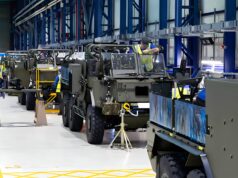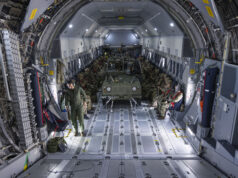Urgent assistance is needed with the supply of ventilators and components. Please register if you can assist.
“The government is looking for businesses who can support in the supply of ventilators and ventilator components across the UK as part of our response to COVID-19.”
The Government are looking for businesses with the following skills:
- design/specification
- rapid prototyping
- contract/product assembly
- certification/regulation/testing
- logistics
- medical training
If you think your business can help, please register your details before midday on 18 March 2020.













Boris chaired a teleconference on Monday evening with various design and engineering companies on this specific topic. Those present on the call all aim to have detailed proposals on how to achieve this (design, manufacture, etc), by the end of the week.
As we saw during WW1 & 2, UK industry quickly switched to wartime products. However, it did not happen overnight and took many months. One major difference today is the ability to rapid prototype and in some circumstances, those parts can be fully functional meaning, very little lead time to assembly. Sadly, some 3D machines are too slow to satisfy demand so there may be a scheme where ventilators are built to basic standards, but have a limited life? This would enable the NHS to increase the numbers of patients on oxygen, but would require a stream of machines constantly in the system supply? One thing is clear, the Government will need to ensure adequate stocks in the future, to tackle any derivative of Coronavirus, that may mutate going forward?
this is the problem with relying on outsourcing from outside the UK,the only hope that can come of this virus is we as a country wake up and start to manufacture more in our own country for our own needs,instead of this cost cutting and getting it made abroad so fat cats can get fatter
Bravo.
We manufacture far more in the U.K. than people think. Globally we’re the 11th largest manufacturer by value. We just tend to concentrate on specialised and high-end manufacturing as we can compete against the Far East.
Parts are an issue though, due to the increase in global supply chains and ‘just-in-time’ delivery. These may be more efficient but clearly have far poor resilience against disruption. (Thankfully we have warehouses full at the moment over fears of disruption due to Brexit.)
Hopefully one of the things that will come out of all this is the need to be more self-reliant if we’re to survive future pandemics/ wars/ natural disasters/ etc.
Spot on Sean, some factories manufacture one or 2 parts and sell into a global supply chain meaning massive economies of scale and cheap goods that we all have come to love. The reality is it wasn’t the government that pushed work overseas the UK consumer started switching to foreign cars and white goods decades ago. So many people complain about UK manufacturing whilst having a BMW, Merc or other German car sat on the drive. We import £49billion of vehicles annually, that’s in the UK consumers power to change.
The problem is what does the next disaster look like, we can’t cover all bases. What we perhaps need to do is be looking at future tech like additive manufacturing and improving it so we can turn on tap an produce what we need quickly.
Hi George,
I’d just like to say that these NHS posts / articles that you are putting up are great. They reflect a kind of industrial / community mobilisation that only an effective nation state with strong community cohession can really achieve. (Countries with less effective state machines will likely still demonstrate strong community responses where good local leadship exists, I would suggest, such is th ehuman spirit.)
This particular issue around ventilators and Sean’s comment highlight the kind of response that can be achieved in an emergency and it is heartening to know that industry government and public services can respond in this way.
The speed of this emergency, especially over the last 2 weeks, is stunning but the way most people seem to be responding is also encouraging. I know that the shops have been cleared which on the face of it is daft, but if it reflects people’s intentions to self isolate then perhaps it is not such a bad idea.
Remember this virus is very mild in most people which is why it is spreading so quickly because many do not know they have it. So if everyone self isolates then that will slow the spread significantly. Coming out of isolation will be a challenge as the virus is still out there and there will be no heard immunity so expect a second wave. This is why the UK was trying to Mitigate rather than Suppression to allow younger people not in the vulnerable groups to catch the virus and develop heard immunity. Quite clever really when you think about it. Trouble is Italy’s experience highlighted that the death rate was higher amongst vulnerable groups than the original data from China suggested. So when this new figure was put into the models by Imperial College it turned out that the risks for the UK was a totally overwhelmed NHS and 250,000 deaths. That’s a lot of grief in a short time. Hence the scramble to change course over the weekend and Monday’s [shocking for some] briefing.
https://www.bbc.co.uk/news/health-51915302
Having said all of that the real horders and those stealing hand sanitisers from hospitals are putting seriously ill patients including cancer patients and children at risk. There are reports that some of these sanitisers are being sold on ebay! Perhaps if we see this we should report it to ebay to get the accounts taken down?
https://www.bbc.co.uk/news/uk-england-northamptonshire-51771584
Finaly, I would like to make one more point – we should be giving our NHS staff proper protective clothing and they should be tested regularly. I can understand if the government is struggling to get the supply of test kits ramped up, given the speed at which things are changing and that even the scientists are struggling to keep up, but surely getting more disposable plastic coveralls is possible?
Thanks again for the articles George and stay safe one and all.
CR
As some readers may be aware, my current day job involves working in the NHS. We have had sanitiser and masks stolen from the ward themselves, I’ve personally caught more than a few. I will add though, we do have appropriate PPE at all levels of staff.
Thank you for the above and take care,
George
Join the discussion…
It is good that the government are wanting engineering companies to make ventilators, but they are not useful if there are not enough trained staff to use them My wife who has just recently retired, was the clinical lead (matron) at two intensive care wards at two hospitals, has taken the decision to let our local hospital that she is able to help. My wife ‘s worry is that there are just not enough suitable qualified nurses to work in critical care, as it takes 8 weeks of training to have the basic skills.
George we have been seeing Hand sanitizer being stolen from GP practices practices to the point that all the sanitizer bottles were being stripped from a practice in a morning. Practices are having to stop placing hand sanitizer in public areas.
At the same time we are seeing an expansion of local groups being set up to support the elderly and in need.
Seeing the very worst and very best in the British public.
We have around 5,000 ventilators in the UK but it isn’t public knowledge how many of those are in working order or how well spread they are around the country. For instance I found out there are only 2 in Eastbourne, a town of 107,000 people with an above average age demographic, plus all the surroundings areas that hospital serves.
I have seen projections that we may need in excess of 40,000 people ventilated at a time if the worst case scenario comes to fruition. Lets hope it doesn’t and that UK industry is able to rise to the challenge.
There are 4,000 ICU beds and each needs a ventilator. There is a dramatic need to up the number of ICU beds to 20K at least. Main manufacturers of medical ventilators are in USA, New Zealand, Germany and Italy. EU has put a ban on exports of medical equipment and the others are very busy meeting American and Asian demand so none of these suppliers can be relied on in the short term. That said the NHS anesthetists also use ventilators during operations and some, of these could be adapted in the short term while designs are produced rapidly here. There are some basic open source designs that use easily found components.
Actually I’ve just read a story stating that the biggest manufscturer of ventilators is in Switzerland. So hopefully UK can get some from there. Altho their priority is Italy at moment. Note France only has 5000 ventilators too. So UK not alone. Germany has squillions – 25000. But then again it expects other countries to defend it !
Prob is modern ventilators are highly technical and take years to design. Maybe UK should look at simple 50’s style iron lung. Maybe not top notch but quick to produce and relatively effective likely.
I’m not an expert but isn’t oxygen also a substitute for a ventilators? I understand that Italy had cases where oxygen ran out so ventilators are preferred.
I believe they sent an oxygen/nitrogen mix in and extract CO2, so they also need a supply of gasses. The wizardry are the sensors that ensure the exact amounts are supplied and monitor oxegen and CO2 levels in the bloodstream. Different models are used for unattended patients in ICUs and attended patients during surgery.
Thanks for that.This sounds like the tricky bit.Not that I don’t think it can be overcome on war footing. The liberty ships and stens weren’t the greatest products, but they were the best because they were there.
expat – Oxygen and Equipment work together,’Ventilator’ is a generic term,the Machine in the top picture is whats known as a Bipap,we also have Oxylogs,Optiflows to name a few,they all used piped Oxygen fed through them.
Thanks. I heard UK manufacturers of aircraft life support systems are looking to see if they can supply the NHS. Not sure if a fighter jets OBOGS could be adapted but at least people are thinking.
Most of these devices are built by Philips/Siemens etc,there are other makes but cant recall them at the moment.
This should already be underway. Talking to engineers about this, they reckon that on a war footing they would be able to start banging out ventilators in a surprisingly short time, a couple of weeks. This would be for a few hundred possibly a thousand,gearing up for larger quantities will take a few months.They are chomping at the bit.
Would it not be quicker to licence build an existing, approved ventilator? Why not give UK factories making these, a 50% reduction in their business rates for the next 18 months?
I would have thought we would be assembling ventilators not manufacturing them. This is something industry could do with reasonable speed, hence the car manufacturers being asked as much of what they do is assemble from parts.
Fitting factories out with plastic injection mouldings and presses and motor winding etc would prove very difficult and have long lead times, but getting the parts to assemble would be much more efficient assuming consent from the intellectual owner of the product.
Plastic injection moulding is probably the easy bit these days, at least for smaller quantities, could be done in a couple of weeks. 3D printing is a bit expensive but doable for a couple of thousand ventilators to be built very quickly. Intellectual property, we can reverse engineer it and deal with that later. In the circumstances it might be possible to downgrade the specifications a bit. I am amazed this hasn’t been started yet. F1 could have easily produced at least a few already, although they would be extremely expensive.
DHSC have sent out blueprints of designs to manufacturers for their review.
George, I posted on another thread a question. Would increasing the number of people we give pneumonia vaccine to, decrease the need for ventilators?